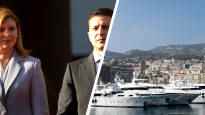The summit brought thousands of officials, assistants and journalists to Brussels. The Europe Letter covers key EU issues every Friday. You can order the entire letter to your email.
Rikhard Husu,
Anna Karismo
The corona pandemic is only a memory: it feels like watching life in the spring in Brussels. The mask is a thing of the past and the terraces of the restaurants are crowded.
The winds of change are also blowing in the EU institutions. After a two-year period marked by a corona pandemic, the Union’s institutions are returning to normal routines.
Meetings are again held on site and plenty of physical press conferences and meetings are held for journalists to the delight of the correspondent. Satisfaction with the two-dimensional nature of remote meetings is evident after severe restrictions.
In the European Parliament the first multi-month voting was held yesterday on Thursday. Until now, it has also been possible to vote remotely. Enthusiasm in the Chamber was palpable, describes the source in Parliament yesterday’s mood.
Although the old powder has its side, the child should not be allowed to go with the wash water, Parliament is considering. Korona has forced institutions into a digital leap, which has helped make the daily lives of MEPs easier. The work in the committees will continue in hybrid form until the summer.
European Council has also opened its doors to journalists. A whopping 1,400 journalists have been accredited to the current summit. The attraction is the President of the United States Joe Biden, which will meet EU leaders on Thursday and Friday. Here you can follow the events related to the war in Ukraine.
However, the proposal to sanction oil and gas imports from Russia divides EU countries. The decision would have significant effects on the economy and energy supply. Alternative energy sources are being feverishly considered.
The leaders will also discuss the EU’s strategic compass. It is a binding document prepared for two years, outlining the Union’s security policy prospects over a period of 5 to 10 years.
Among other things, the EU wants to improve its capabilities with a rapid reaction force of 5,000 troops. Member countries are also committed to investing more in defense in the coming years.
It would have been good to invest in defense years ago, and the corridors in Brussels are shrinking. Post-wisdom is known to be the best wisdom.
Sunny spring days,
The final letter has been compiled by the editor Anna Karismo. Read the gigs over the week and next week’s upcoming events below.
Please note that from now on, the renewed European letter will only be sent in full by e-mail (you will switch to another service). There, among other things, more about the mystical, stationary luxury yacht in the Mediterranean and why the Russian economy is enduring despite sanctions.
Listening recommendation: Admirer of Hitler
Now that the world tense, does it join (you switch to another service) Belarus on Russia’s front, it is worth listening to Arena’s “12 Dictators” episode of the country’s president Alexander Lukashenko. Lukashenko combines a healthy lifestyle with sick thoughts. He is a Soviet breeder who admires Adolf Hitler.
Next week: Working together to help refugees and prevent the coronavirus in poor countries
Tuesday health ministers outline the union’s solidarity in corona vaccination. The goal is donate (go to another service) 700 million vaccines for poor countries by the summer.
You can discuss the content of the letter from the link below. The debate is open until Saturday evening, March 26th. until 11 p.m.
